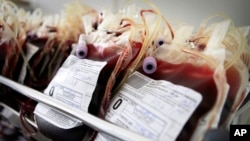WASHINGTON —
The parliamentary health committee on Tuesday expressed concern at the high cost of blood in the Zimbabwe’s hospitals.
At $200 per unit, parliamentarians said this was far beyond the reach of many people in Zimbabwe.
But representatives of the National Blood Transfusion Service (NBTS) told the committee they could not explain the high cost of blood in hospitals saying they charge $135 per unit.
The NBTS operates as a non-profit. Officials told the health committee the service works on a cost recovery model, with operational charges covering costs of duplicate tests on HIV, Hepatitis B and C and syphilis.
Officials added the cost of blood units paid in hospitals may reflect the institutions’ administrative costs.
Last year public and private health institutions owed more than a million dollars to the NBTS, forcing patients to unusually pay directly to the organization when in need. But patients still complain the cost of blood remains too high.
Mfundo Ngwenya, spokesman for the NBTS, said the organization is managing to supply blood to members of the public even as financial constraints continue.
At $200 per unit, parliamentarians said this was far beyond the reach of many people in Zimbabwe.
But representatives of the National Blood Transfusion Service (NBTS) told the committee they could not explain the high cost of blood in hospitals saying they charge $135 per unit.
The NBTS operates as a non-profit. Officials told the health committee the service works on a cost recovery model, with operational charges covering costs of duplicate tests on HIV, Hepatitis B and C and syphilis.
Officials added the cost of blood units paid in hospitals may reflect the institutions’ administrative costs.
Last year public and private health institutions owed more than a million dollars to the NBTS, forcing patients to unusually pay directly to the organization when in need. But patients still complain the cost of blood remains too high.
Mfundo Ngwenya, spokesman for the NBTS, said the organization is managing to supply blood to members of the public even as financial constraints continue.




